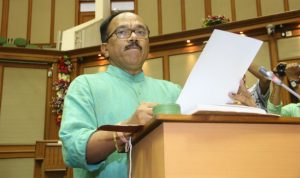
09-05-2017 (Important News Clippings)
To Download Click Here.
French revolution
Emmanuel Macron shows how liberals can turn the tide against populism

In the second round of presidential polls Macron won a substantial 66% of votes, defeating far right rival Marine Le Pen. Macron’s election is a shot in the arm for European unity. It puts to rest – at least for the time being – fears of a French exit or Frexit from EU, even if that news is badly received in London, Washington or Moscow. Given that the UK seems to be careening towards Brexit, Macron’s ascent makes a hard Brexit more likely.
Macron has strongly advocated for a reformed EU and pitched for a national renewal that would enable France to take advantage of a globalised world. In that sense, Macron offers the perfect mix of liberal, internationalist values and the need for change. He has promised to unleash entrepreneurial spirits, re-orient the French welfare regime, and prepare people for jobs of the future. Macron’s victory also highlights how continental Europe is upending the Anglo-Saxon trend of growing protectionism. Earlier this year Holland voted against the far-right Party of Freedom of Geert Wilders, choosing to go with incumbent Prime Minister Mark Rutte. While right-wing populist parties have been quick to capitalise on a widespread yearning for change, Macron has shown that by offering a new political ideal that transcends the traditional left-right divide, liberals too can take advantage of this yearning for change.
Plus, it is also possible that electorates are getting tired of the fear-mongering, hyper-nationalist identity politics that right-wing parties have been offering. There’s reason to believe that leaked emails targeting Macron ahead of the presidential run-off backfired for his opponents. But for Macron to consolidate his victory he must now secure a majority for En Marche! in French parliamentary elections next month. Else the French electorate would have sent confused signals by tying Macron’s hands.
Basic question
Does Congress agree with its MP’s view on “basic structure” doctrine? Does it also believe that executive power must be overriding?

Just as Naik’s letter cannot be read outside of its political context, it cannot be distanced from his party affiliation. Does the Congress share the view of its MP from Goa, who, incidentally, has also been chairman of the parliamentary standing committee of law? Does the Congress also believe that there must be no substantive constraints on lawmaking, and that the power to amend the Constitution must also carry within it the power to destroy its essential features? The party must answer.
Date:08-05-17
The politics of revenge
Impending impeachment of the chief justice inaugurates a new crisis.
Kalyan Shrestha, who retired as the chief justice of Nepal only a year ago, claimed that the impeachment motion against his successor, Sushila Karki, was a brazen attack on the independence of judiciary. Shrestha, who became a commissioner of the Geneva-based International Commission of Jurists after retirement much in violation of the judges code of conduct, said CPN (Maoist-Centre) chairman and Prime Minister Pushpa Kamal Dahal and Nepali Congress chief Sher Bahadur Deuba “must resign” if the impeachment motion is defeated in the House.
The ICJ and Human Rights Watch, closely working with Nepal’s human rights organisations, are putting pressure on the two parties to withdraw the motion immediately on grounds that it is “politically motivated” and an “attack on the independence of the judiciary”. Nepal’s political parties and the civil society are sharply polarised on the issue, with no compromise in sight. The main opposition, the Communist Party of Nepal-Unified Marxist Leninist, which is closely working with the international bodies on the issue, even tried to obstruct the tabling of the motion that the ruling coalition is determined to go ahead with.
The frequent threat to impeach, a provision that was expected to be used sparingly under a constitution that gives undue power to the legislature (political parties) over the judiciary and other constitutional bodies, works against the principle of the separation of powers. It can damage the edifice of democracy. All the major parties, both for and against the impeachment motion, are equally guilty of undermining the balance between the institutions.
The radical journey that Nepal embraced in 2006 was perhaps the first step to bring the judiciary under the decisive influence of the political parties. The latter, probably, were fearful that an independent judiciary will come in the way of the political journey they desired for the nation. All the sitting judges of the Supreme Court, including the chief justice, were asked to take a fresh oath, which appeared like an oath of loyalty to the new regime. None dared to resign or refuse to take the fresh oath in that euphoric moment. This surrender was in contrast to the courage Nepal’s judiciary had exhibited in the past. Nepal’s judiciary, led and packed with people, mostly god-fearing scholars, has stood in favour of individual liberty and the right to organisation much before the advent of multi-party democracy in 1991. The judges were not asked in 1959 or in 1991, times of major political upheaval, to take fresh oaths. However, the experiment in 2006 has attempted to curtail the judiciary’s independence.
The four major parties — Nepali Congress, UML, Maoists and the Madhesi groups — that dominated politics post 2006 have benefited from the quota system that allows political groups a say in the appointment of judges. In 2012-13, these parties even agreed to have the sitting chief justice of the supreme court, Khil Raj Regmi, head a coalition government that included their representatives. “The collective consent” sealed the fate of an independent judiciary. Ironically, neither the ICJ nor any other international organisation warned against the consequences of the move.
The current impeachment, second in the past six months, is worrying for two reasons. First, it has polarised political forces and the civil society; and second, the parties that were together at the time of appointing judges and members of the constitutional bodies are now out to destroy each other. This politics of revenge and intolerance brings everyone — from the president and vice president to judges and members of the constitutional commission — in the strike range of the impeachment missile. All it requires is for one-fourth of the House, which has an effective strength 593, to sign and submit the motion to parliament secretariat. The practice so far is that the person targeted stands suspended immediately from the post he holds until the case is settled, something that may continue beyond their tenure. There are fears that the UML may launch an impeachment motion against senior judge(s) opposed to Karki.The Supreme Court on Friday gave a temporary reprieve to CJ Karki by ordering that she be allowed to return and head the judiciary. This may now trigger a new phase of confrontation between the parliament and judiciary and create an awkward situation for CJ Karki. After all, it was parliament that suspended her, pending impeachment
सहयोग का संचार
दक्षिण एशिया संचार उपग्रह अंतरिक्ष अनुसंधान तथा तकनीक के क्षेत्र में अंतरराष्ट्रीय सहयोग का एक और उदाहरण है। यह भी कहा जा सकता है कि यह उम्दा कूटनीति की एक मिसाल है। यह उपग्रह एक तरह से सार्क के अन्य सदस्य देशों को भारत का तोहफा है। सार्क के आठ सदस्य देशों में से सात यानी भारत, नेपाल, श्रीलंका, भूटान, अफगानिस्तान, बांग्लादेश और मालदीव इस परियोजना का हिस्सा हैं। और, सफल प्रक्षेपण की खबर आते ही इन देशों के राष्ट्राध्यक्षों ने जिस तरह खुशी का इजहार करते हुए भारत का शुक्रिया अदा किया उससे उपग्रह से जुड़ी कूटनीतिक कामयाबी का संकेत मिल जाता है। सिर्फ पाकिस्तान इस परियोजना का हिस्सा नहीं है। वह इस परियोजना से पहले ही अलग हो गया था, यह कहते हुए कि उसे इसकी जरूरत नहीं है, अंतरिक्ष तकनीक में वह खुद सक्षम है। लेकिन अब उसने अपने अलग रह जाने का दोष भारत पर मढ़ दिया है, यह कह कर कि भारत परियोजना को साझा तौर पर आगे बढ़ाने को राजी नहीं था। पर इस आरोप में दम नहीं दिखता। सार्क के बाकी सदस्य देशों की शिरकत यह बताने के लिए काफी है कि भारत ने आपसी सहयोग की भावना से ही पहल की और उसे आगे बढ़ाया। प्रधानमंत्री नरेंद्र मोदी ने 2014 में यह पेशकश की थी कि भारत ऐसा उपग्रह प्रक्षेपित करेगा जिसके आंकड़े सार्क के सभी सदस्य देशों से साझा किए जाएंगे। आखिर बीते शुक्रवार को वह वादा पूरा हो गया, जब इसरो ने दक्षिण एशिया संचार उपग्रह का सफल प्रक्षेपण किया।
इसरो यानी भारतीय अंतरिक्ष अनुसंधान संगठन के नवीनतम संचार उपग्रह ‘जीसैट-9’ को एसएएस रोड पिग्गीबैक कहा जाता है। जीसैट-9 दो हजार दो सौ तीस किलोग्राम की वहन क्षमता वाला भूस्थैतिक संचार उपग्रह है। यह केयू बैंड में दक्षिण एशियाई देशों को टेली-कम्युनिकेशन, टेलीविजन, डीटीएच, वीसैट, टेली शिक्षा व टेली मेडिसिन जैसी विभिन्न संचार सेवाएं मुहैया कराएगा। यह बाढ़, सुनामी, भूकम्प और चक्रवात जैसी आपदा की स्थितियों में बेहतर प्रबंधन में मददगार होगा। तकनीक के लिहाज से देखें तो इस उपग्रह में कुछ नया नहीं है। ऐसे कई उपग्रह भारत प्रक्षेपित कर चुका है। इनसैट की सीरिज ही इस तरह की थी, जिस सीरिज का आखिरी उपग्रह 2007 में प्रक्षेपित किया गया। अब तो जीसैट सीरिज के उपग्रहों का दौर है, जो देश में बहुत तरह की सेवाएं मुहैया करा रहे हैं। लिहाजा, दक्षिण एशिया संचार उपग्रह यानी जीसैट-9 में कुछ अपूर्व है तो यही कि पहली बार, पाकिस्तान के अपवाद को छोड़ कर, दक्षिण एशिया के देश एक पांत में बैठ कर अंतरिक्ष तकनीक के फल खाएंगे। अलबत्ता इस परियोजना का खर्च केवल भारत उठाएगा।
अंतरिक्ष कार्यक्रम में यों भी दक्षिण एशिया के ज्यादातर देशों की कोई खास गति नहीं है। जबकि भारत की गिनती दुनिया के उन देशों में होती है जो अंतरिक्ष अनुसंधान में अव्वल हैं। इसरो की सेवाएं लेने में अब कई विकसित देश भी दिलचस्पी दिखा रहे हैं। सार्क की हालत ठीक नहीं है। सार्क की मुहर लगने के बाद प्रक्षेपण होना होता, तो क्या पता अब तक न हो पाता। पर इसरो की काबिलियत का एक कुशल कूटनीतिक उपयोग कर भारत ने दक्षिण एशिया में आपसी सहयोग का पैगाम दिया है। अलबत्ता अंतरिक्ष कार्यक्रम में अंतरराष्ट्रीय सहयोग का सबसे बड़ा उदाहरण यूरोपीय स्पेस एजेंसी का है जिसमें बीस से ज्यादा देश शामिल हैं।



